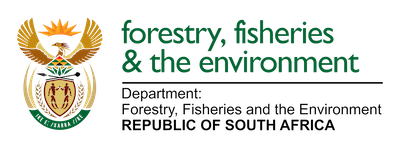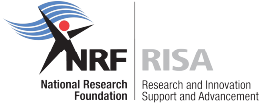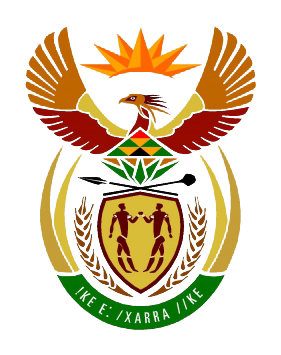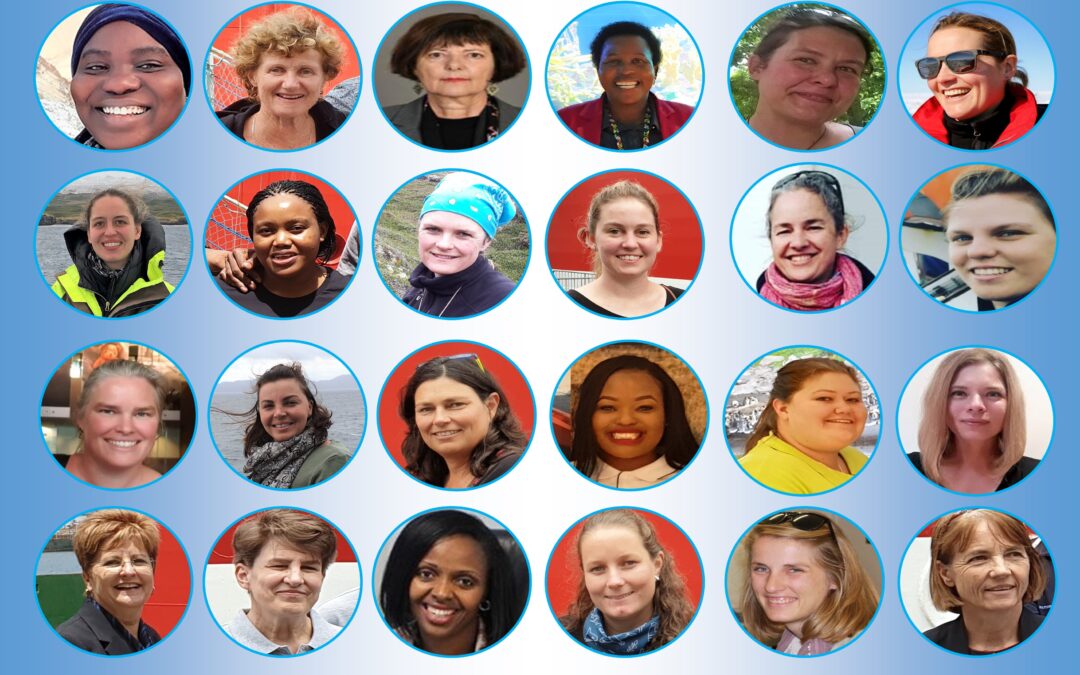
by Ria Olivier | Aug 9, 2020 | Antarctica, Fellowship, STEM, Women in Science
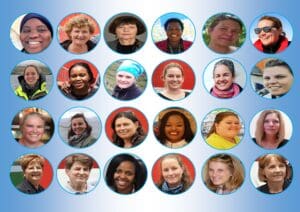
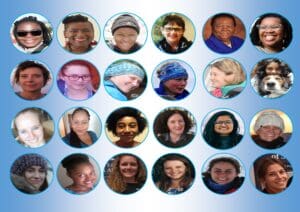
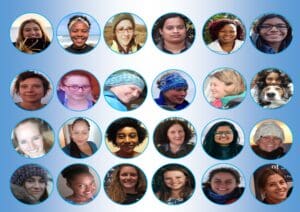 On South Africa’s National Women’s Day we celebrate all the women involved in the South African National Antarctic Programme (SANAP). In the 60 years since the vents of 1956, the phrase has come to represent women’s courage and strength in South Africa. This day is celebrated to empower women and raise awareness. In the last few years many events came about within the Antarctic environment. See the events on the Scientific Committee on Antarctic Research website. In South Africa many women play a leading role within the SANAP.
On South Africa’s National Women’s Day we celebrate all the women involved in the South African National Antarctic Programme (SANAP). In the 60 years since the vents of 1956, the phrase has come to represent women’s courage and strength in South Africa. This day is celebrated to empower women and raise awareness. In the last few years many events came about within the Antarctic environment. See the events on the Scientific Committee on Antarctic Research website. In South Africa many women play a leading role within the SANAP.

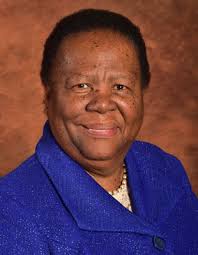
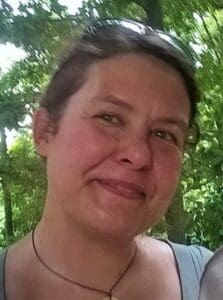 From L-R: The Department of Environment, Fisheries and Forestry: Minister Barbara Creecy; the Department of Science and Innovation: (previous) Minister Naledi Pandor and of the National Research Foundation (NRF) Director: Knowledge Advancement and Support, Tracy Klarenbeek
From L-R: The Department of Environment, Fisheries and Forestry: Minister Barbara Creecy; the Department of Science and Innovation: (previous) Minister Naledi Pandor and of the National Research Foundation (NRF) Director: Knowledge Advancement and Support, Tracy Klarenbeek
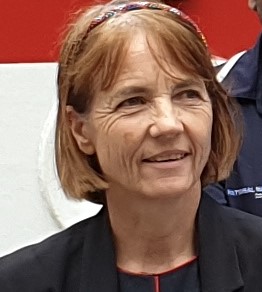
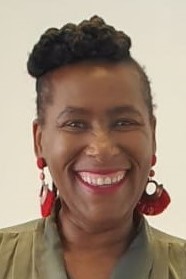
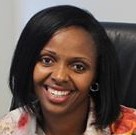 Within the Department of Environment, Fisheries and Forestry; (From L- R) Deputy Director-General Oceans and Coasts: Ms Judy Beaumont, Deputy Director: Vessel and Helicopter Management .Directorate: Southern Oceans and Antarctic Support: Ms Khuselwa Ngxabani; Operations and Logistics. Deputy Director: Chuma Phamoli
Within the Department of Environment, Fisheries and Forestry; (From L- R) Deputy Director-General Oceans and Coasts: Ms Judy Beaumont, Deputy Director: Vessel and Helicopter Management .Directorate: Southern Oceans and Antarctic Support: Ms Khuselwa Ngxabani; Operations and Logistics. Deputy Director: Chuma Phamoli
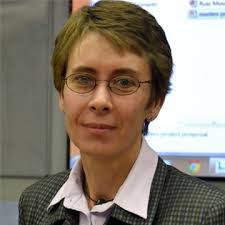
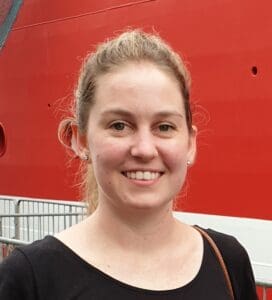
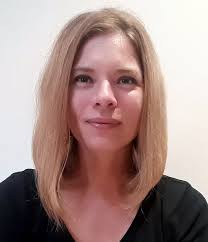
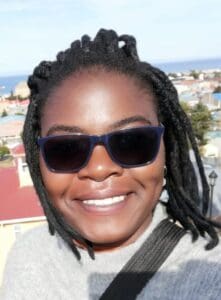 66% of the South Africa National Committee for SCAR is women and chaired by Bettine Jansen van Vuuren(left). 70% of APECSSA is also women, chaired by Liezel Rudolph(2nd) and the founder member was Christel Hansen(3rd). The Champion for South Africa Gateway City, Cape Town is Rudzani Silima(right).
66% of the South Africa National Committee for SCAR is women and chaired by Bettine Jansen van Vuuren(left). 70% of APECSSA is also women, chaired by Liezel Rudolph(2nd) and the founder member was Christel Hansen(3rd). The Champion for South Africa Gateway City, Cape Town is Rudzani Silima(right).
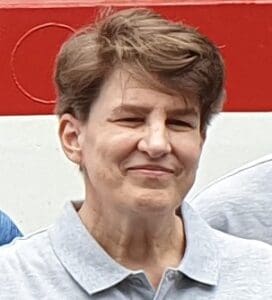
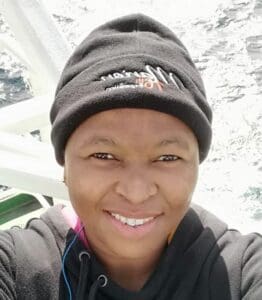
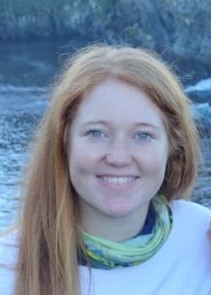 The two team leaders currently at the South African stations on SANAE(59) and at Marion Island(77) are women. Dr Abigail(Aby) Paton (left) is not new to SANAP and the first women to do 3 consecutive overwinters in Antarctica (SANAE54,55,56 see images below). Winnie Moodaley (middle) was a member of Marion 76 and to stayed on as Leader for Marion 77 so this is also her consecutive year. Michelle(Risi)Jones(right) current at Gough Island is part of Gough 64 and Gough 65.
The two team leaders currently at the South African stations on SANAE(59) and at Marion Island(77) are women. Dr Abigail(Aby) Paton (left) is not new to SANAP and the first women to do 3 consecutive overwinters in Antarctica (SANAE54,55,56 see images below). Winnie Moodaley (middle) was a member of Marion 76 and to stayed on as Leader for Marion 77 so this is also her consecutive year. Michelle(Risi)Jones(right) current at Gough Island is part of Gough 64 and Gough 65.
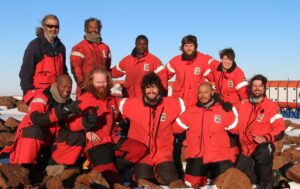
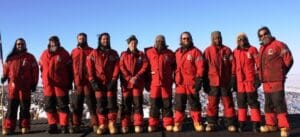
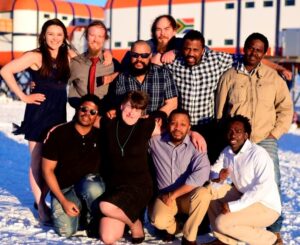 Gendered Power Relations and Sexual Harassment in Antarctic Science in the Age of #MeToo by Meredith Nash and Hanne Nielsen Published online: 09 Jun 2020. “The presence and impact of female Antarctic researchers has increased rapidly. In the 1950s most countries did not allow women to work in Antarctica and there were few female Antarctic scientists. Today females are playing leading and influential roles in Antarctic research.”
Gendered Power Relations and Sexual Harassment in Antarctic Science in the Age of #MeToo by Meredith Nash and Hanne Nielsen Published online: 09 Jun 2020. “The presence and impact of female Antarctic researchers has increased rapidly. In the 1950s most countries did not allow women to work in Antarctica and there were few female Antarctic scientists. Today females are playing leading and influential roles in Antarctic research.”
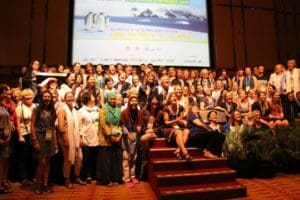
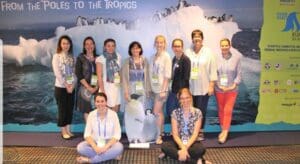 Celebration of Women in Antarctic Research 23 August 2016,Malaysia. This event was a celebration of female Antarctic researchers and aimed to raise their profile to help provide more visible female role models for early career scientists. SANAP was represented(image right).
Celebration of Women in Antarctic Research 23 August 2016,Malaysia. This event was a celebration of female Antarctic researchers and aimed to raise their profile to help provide more visible female role models for early career scientists. SANAP was represented(image right).
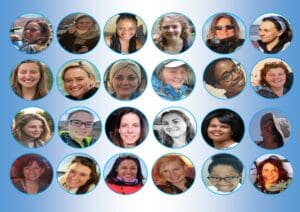
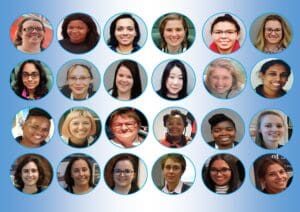
- Join the Facebook group Women in Polar Science
- Follow below on Twitter:
- Ocean Women @OceanWomxn
- WomenInScienceSA @OWSD_SA
- Women in Polar Science @WomeninPolarSci
To read more about the women in history of South African National Antarctic Programme visit the Antarctic Legacy of South Africa website
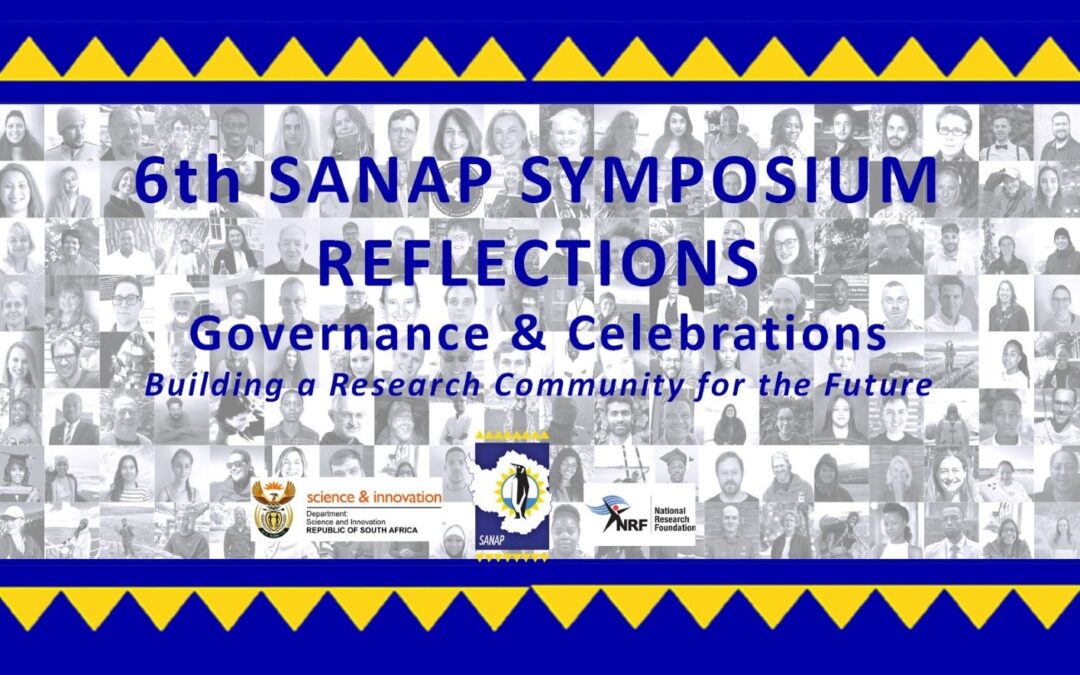
by Ria Olivier | Mar 8, 2024 | Research, SANAP, SANAP Student, Science
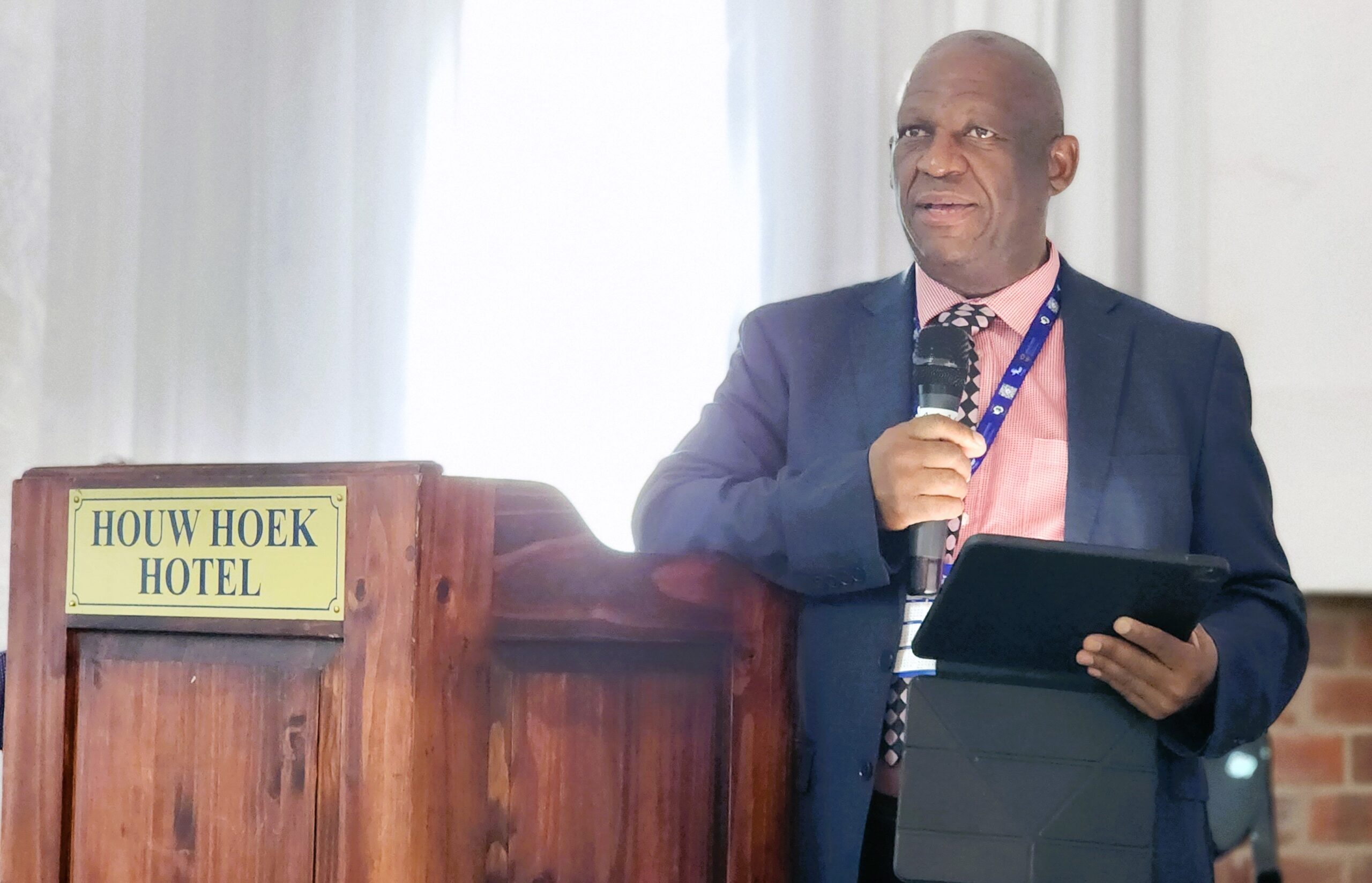 During the 6th SANAP symposium, time was allocated for the presentation of governance issues, and this was done on the first day during the opening ceremony. Dr Gilbert Siko , the Director of Marine & Polar Research at the Department of Science and Innovation gave the first presentation. His role within the Research Development and Support Programme it is to promote the development of research, the production of scientific knowledge, and human capital development in science areas in which South Africa enjoys a geographic advantage, that includes Antarctic and marine research. Dr Siko highlighted the strategic importance of the research conducted through the South African National Antarctic Programme.
During the 6th SANAP symposium, time was allocated for the presentation of governance issues, and this was done on the first day during the opening ceremony. Dr Gilbert Siko , the Director of Marine & Polar Research at the Department of Science and Innovation gave the first presentation. His role within the Research Development and Support Programme it is to promote the development of research, the production of scientific knowledge, and human capital development in science areas in which South Africa enjoys a geographic advantage, that includes Antarctic and marine research. Dr Siko highlighted the strategic importance of the research conducted through the South African National Antarctic Programme.
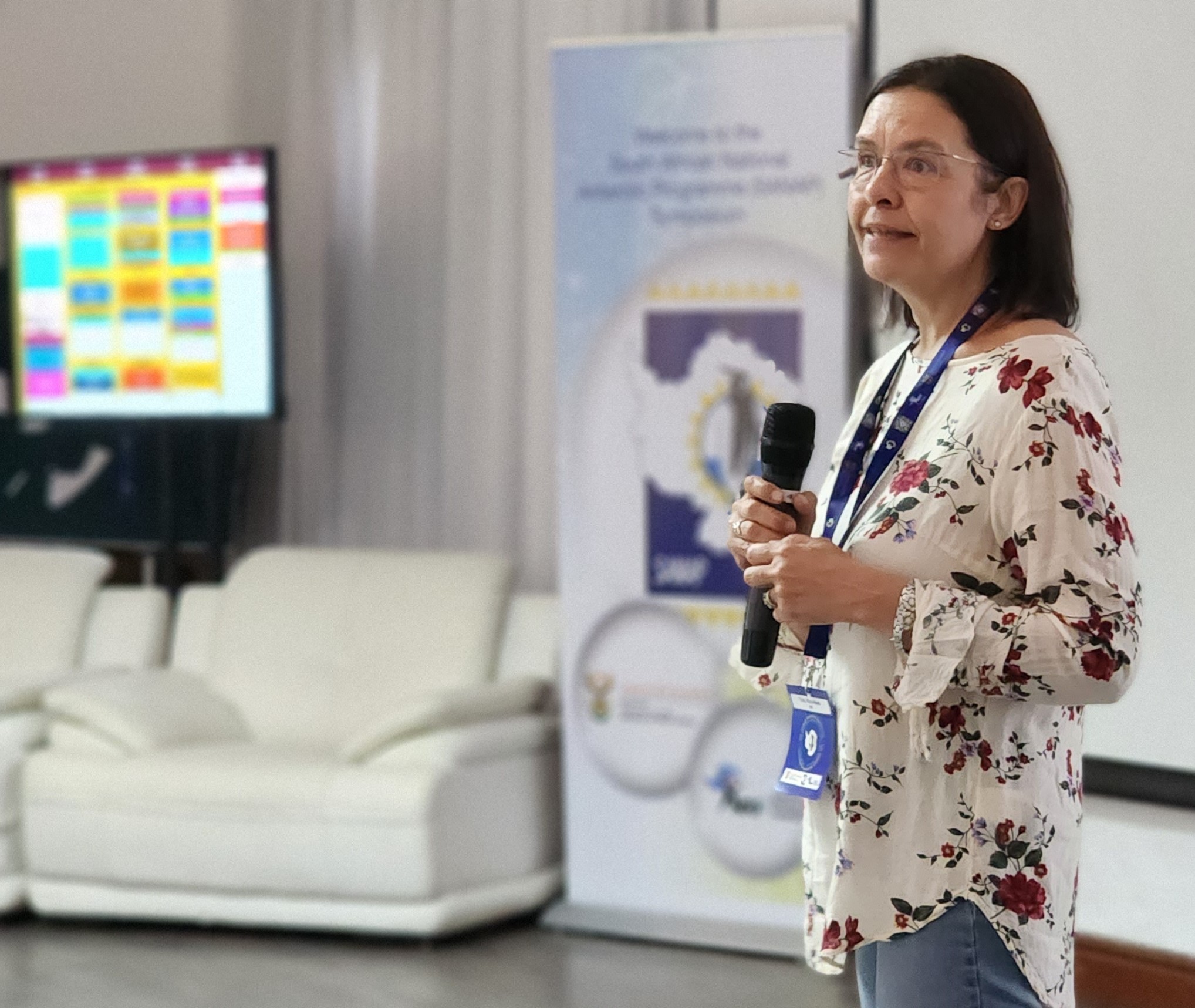 Dr Siko was followed by Tracy Klarenbeek, Director of Knowledge Advancement and Support of the National Research Foundation (NRF). She highlighted that create innovative funding instruments such as SANAP serve to transform the scientific landscape and inspire a representative research community to aspire to global competitiveness. She shared the outcomes of the 2023 SANAP Call for Proposals for funding cycle 2024 – 2026 with the community. She also mentioned that mentorship initiatives for unsuccessful applicants would be implemented via SAPRI.(right)
Dr Siko was followed by Tracy Klarenbeek, Director of Knowledge Advancement and Support of the National Research Foundation (NRF). She highlighted that create innovative funding instruments such as SANAP serve to transform the scientific landscape and inspire a representative research community to aspire to global competitiveness. She shared the outcomes of the 2023 SANAP Call for Proposals for funding cycle 2024 – 2026 with the community. She also mentioned that mentorship initiatives for unsuccessful applicants would be implemented via SAPRI.(right)
Dr Siko was followed by Tracy Klarenbeek, Director of Knowledge Advancement and Support of the National Research Foundation (NRF). She highlighted that create innovative funding instruments such as SANAP serve to transform the scientific landscape and inspire a representative research community to aspire to global competitiveness. She shared the outcomes of the 2023 SANAP Call for Proposals for funding cycle 2024 – 2026 with the community. She also mentioned that mentorship initiatives for unsuccessful applicants would be implemented via SAPRI.
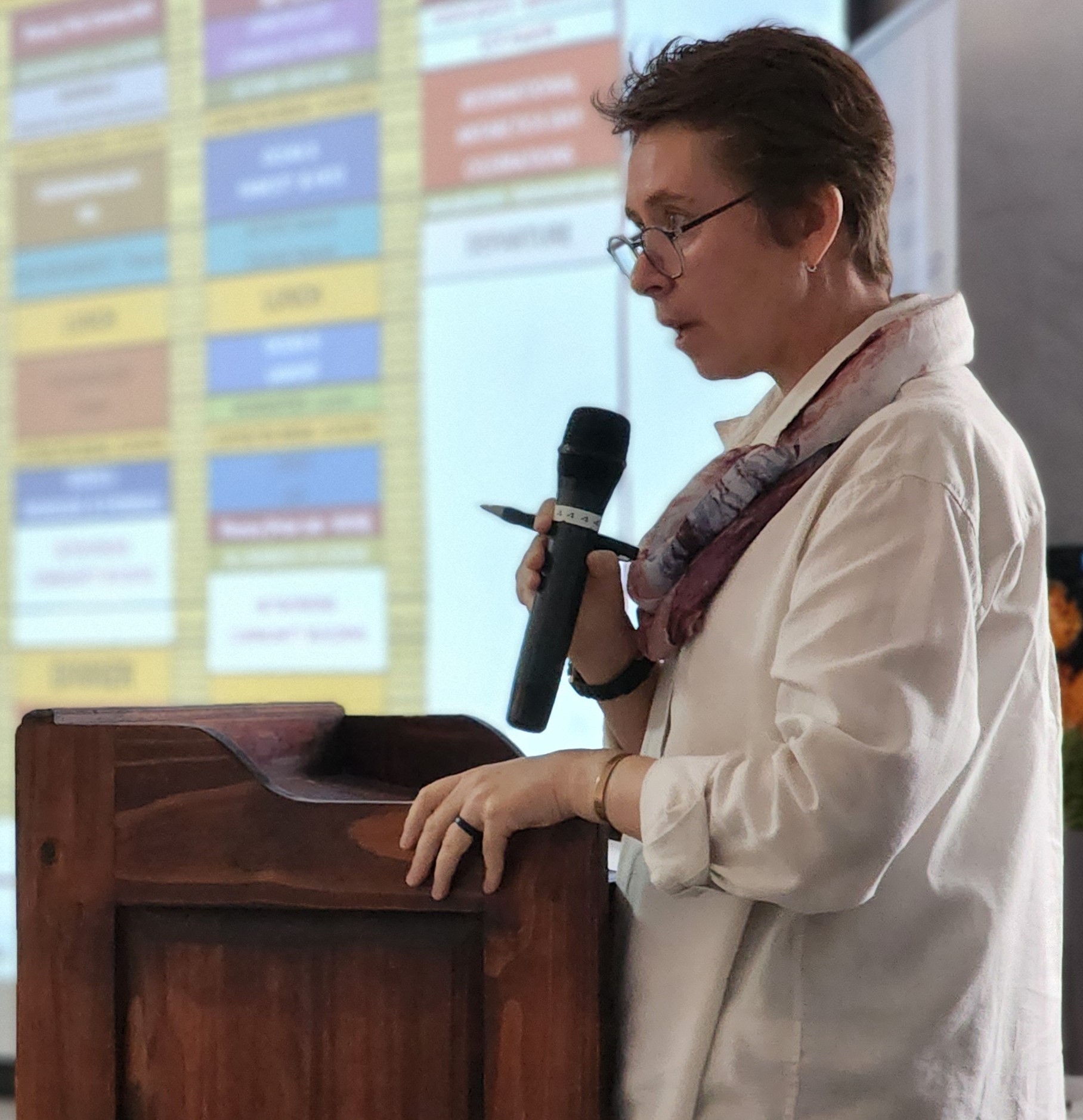
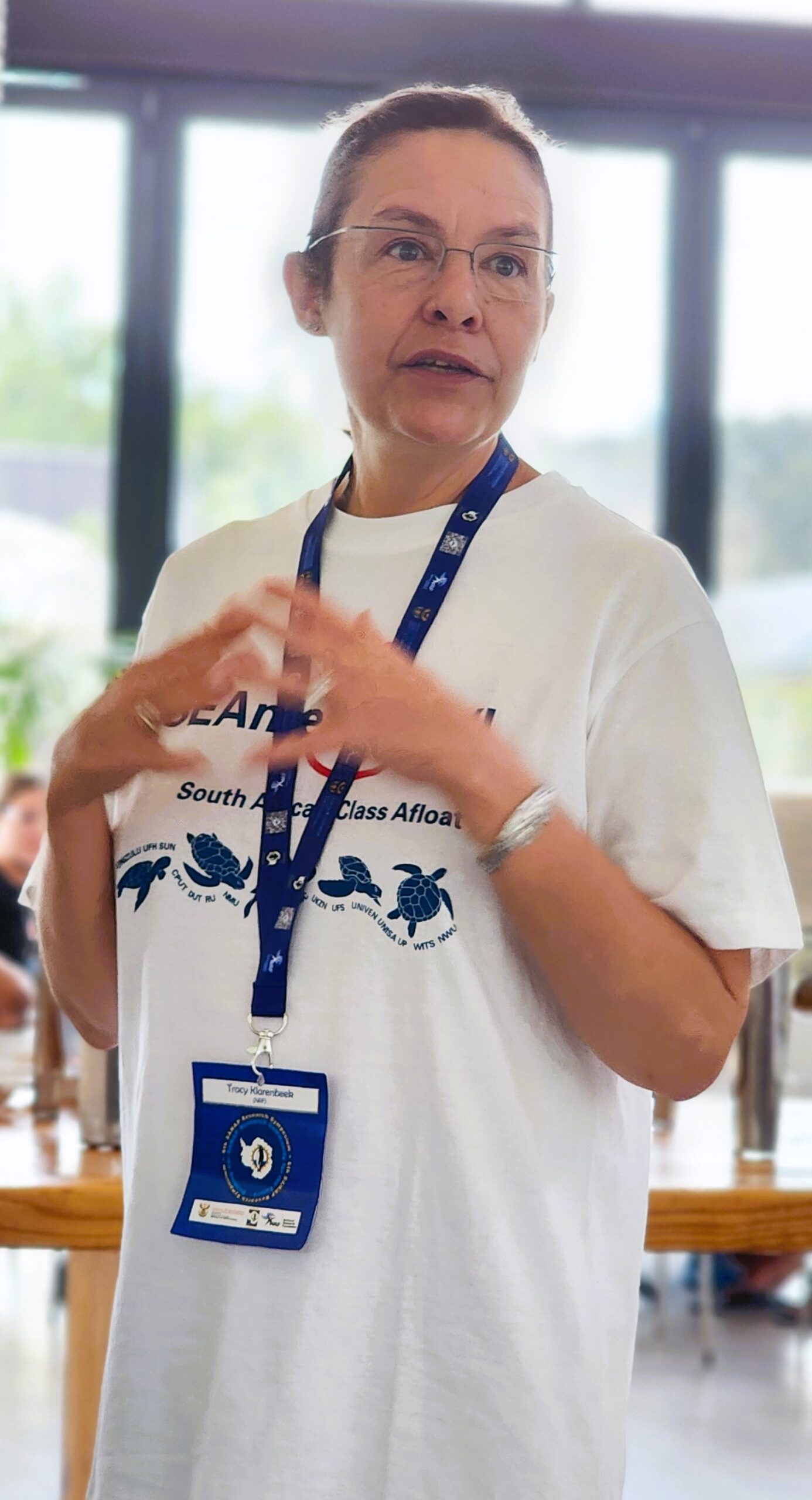 Prof Bettine van Vuuren (right), Chair of the South African National Committee for SCAR gave feedback on the committee meeting. She also highlighted the function and activities of SCAR and the importance to be informed of these activities, and to be aware of scholarship opportunities. She encouraged early career researchers to become involved in SCAR committees and action scholarships.
Prof Bettine van Vuuren (right), Chair of the South African National Committee for SCAR gave feedback on the committee meeting. She also highlighted the function and activities of SCAR and the importance to be informed of these activities, and to be aware of scholarship opportunities. She encouraged early career researchers to become involved in SCAR committees and action scholarships.
The highlight of the Symposium was the international Antarctic day celebrations where Tracy Klarenbeek (left)addressed all attendees during the closing ceremony with a heartfelt talk. All participants, old and new, were thanked for their participation in the Symposium and their dedication to the SANAP programme. Tracy Klarenbeek talk gave a personal perspective of administering the SANAP programme:
“by facilitating Antarctic and Southern Ocean research, and awarding student bursaries, it is evident that the work I do changes lives”.
The opportunity to access the Southern Ocean, Antarctica and the sub-Antarctic islands (Gough and the Prince Edward Islands) is limited to the lucky few, and the work of the National Research Foundation makes this a reality for researchers and students alike.
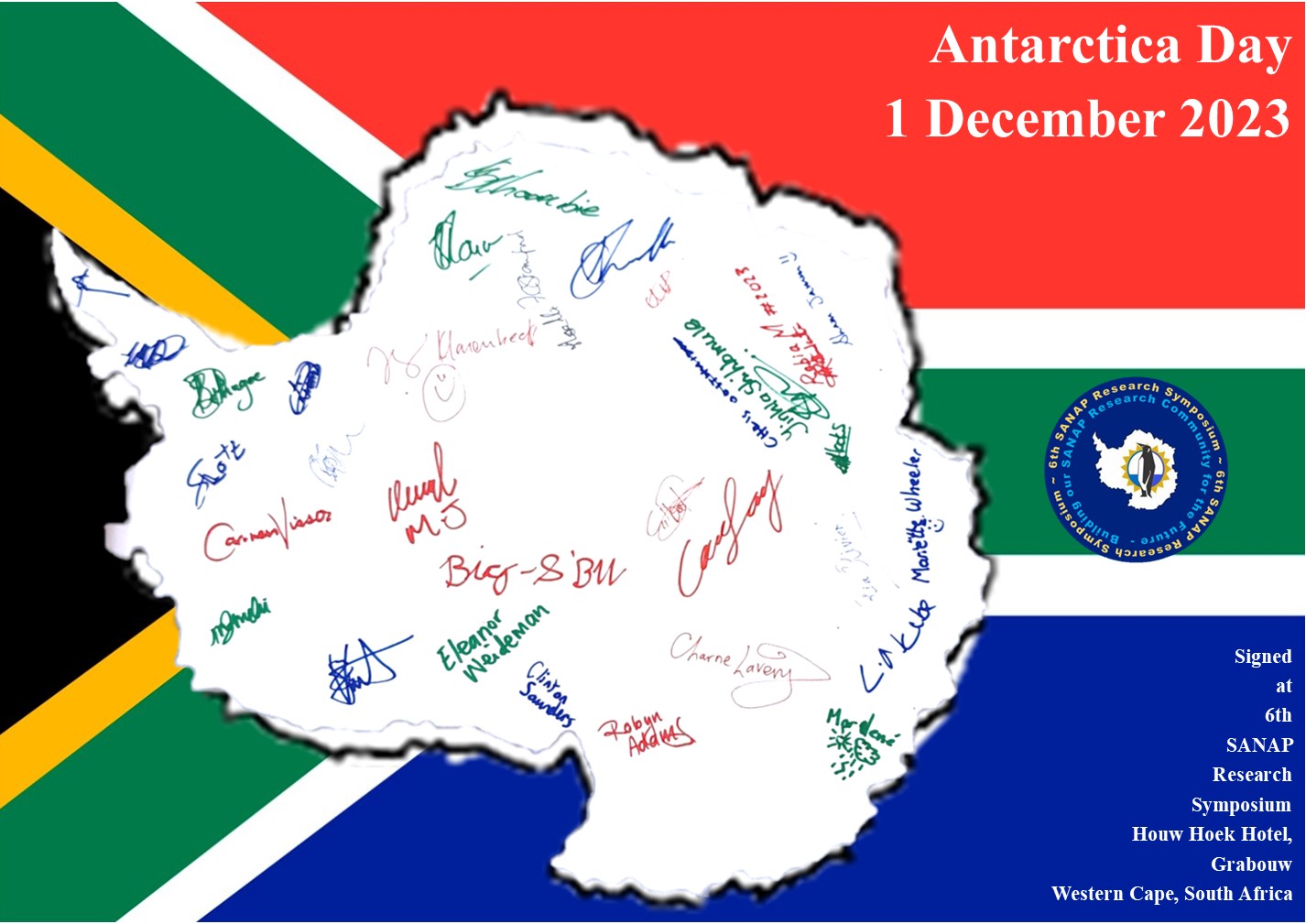 A printed Map of Antarctica was signed by everyone on International Antarctica Day 1st December 2023 at Houw Hoek Hotel!
A printed Map of Antarctica was signed by everyone on International Antarctica Day 1st December 2023 at Houw Hoek Hotel!
Speakers photos: credit Anche Louw – SA Polar Research Infrastructure/Antarctic Legacy of SA
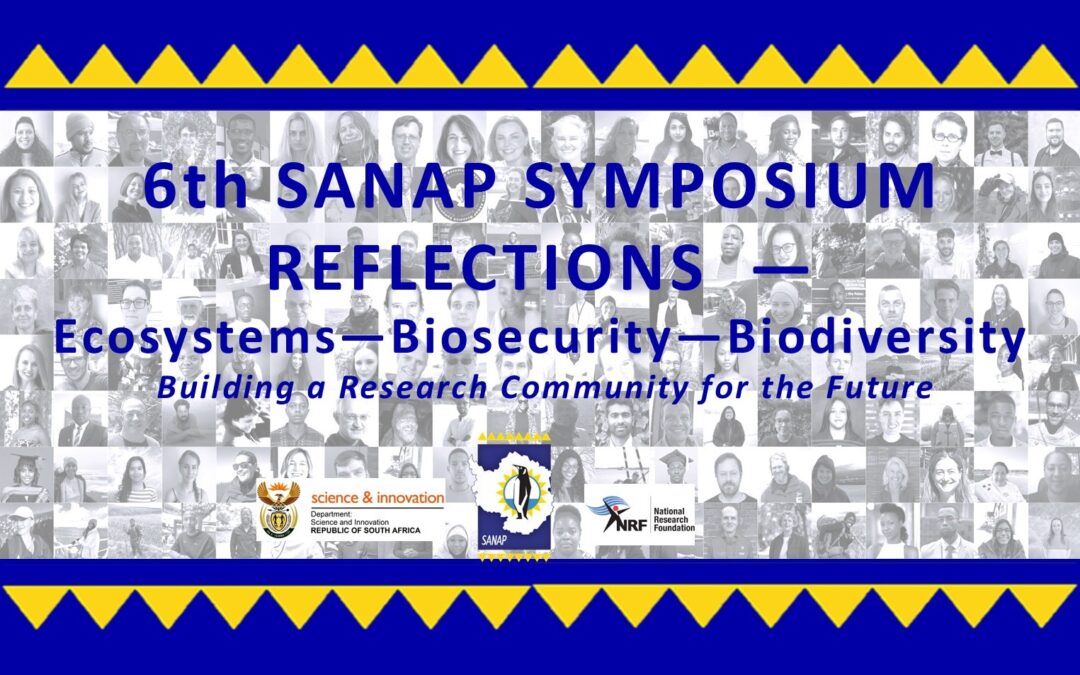
by Ria Olivier | Feb 27, 2024 | Research, SANAP, SANAP Student
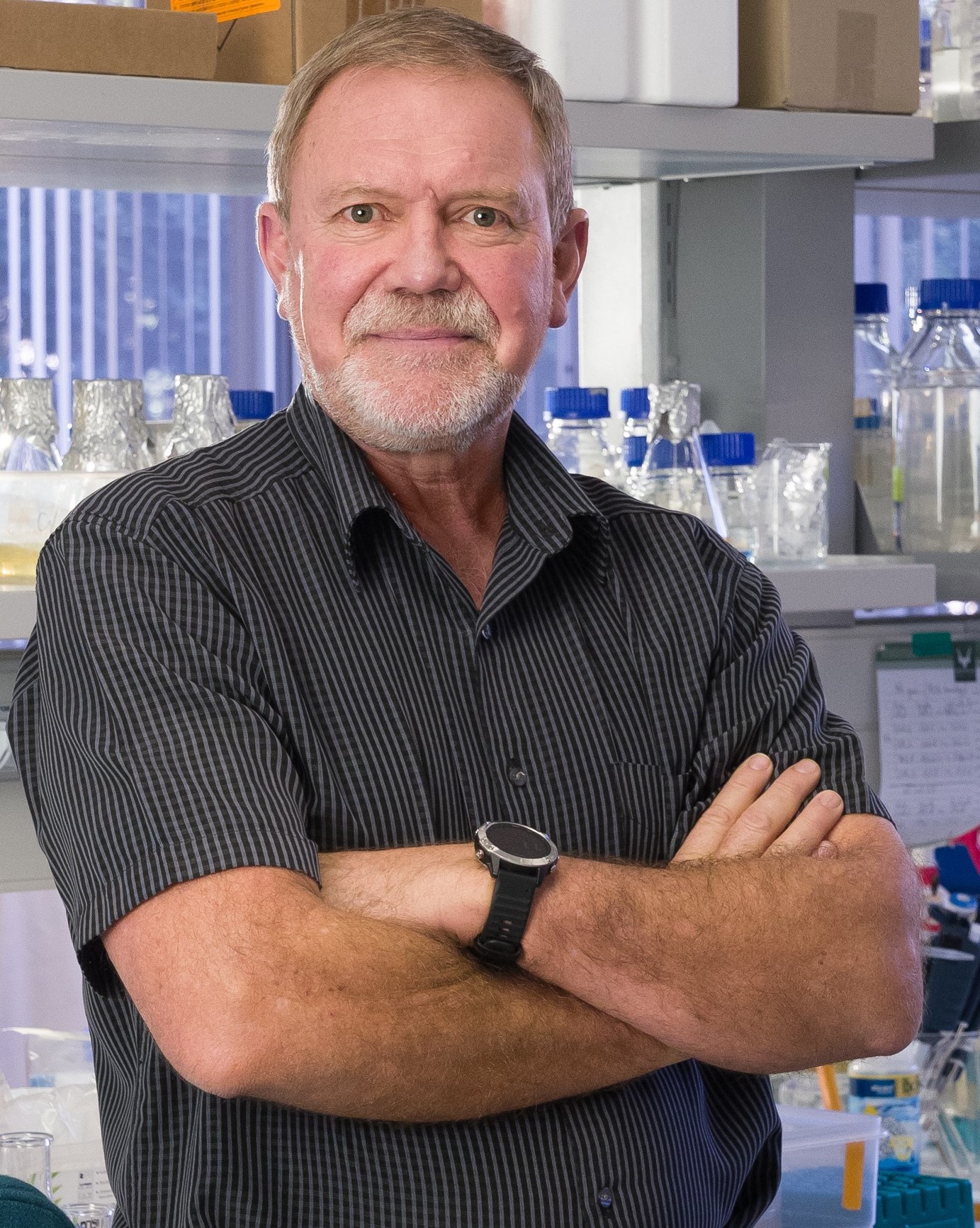 Another session within the Marine and Antarctic Research Strategy research theme : Ecosystems, biodiversity and biodiscovery was chaired by Donald Cowan of the University of Pretoria, he also chaired the session for Thulani Makhalanyane’s project research. Dr Dowan started of the first section with his own presentation followed by research within his project.
Another session within the Marine and Antarctic Research Strategy research theme : Ecosystems, biodiversity and biodiscovery was chaired by Donald Cowan of the University of Pretoria, he also chaired the session for Thulani Makhalanyane’s project research. Dr Dowan started of the first section with his own presentation followed by research within his project.
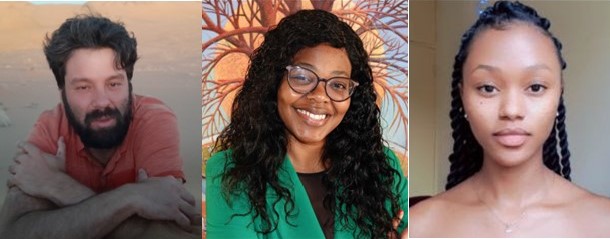 Above (l-r): Pedro Lebre, Silindile Maphosa, Lefentse Mashamaite
Above (l-r): Pedro Lebre, Silindile Maphosa, Lefentse Mashamaite
- Don Cowan: Microbial ecology of Antarctic desert soils. (Abstract)
- Pedro Lebre: Biogeographic survey of soil microbial communities across Antarctica. (Abstract)
- Silindile Maphosa: Exploring the functional potential of microbial metagenome-assembled genomes (MAGs) from sub-Antarctic islands. (Abstract)
- Lefentse Mashamaite: Microbial diversity in Antarctic Dry Valley soils across an altitudinal gradient. (Abstract)
 Prof Makhalanyane project presentations. Above (l-r): Runesu Bakasa, Marike Hillocks, Riaan Pierneef, Mancha Mabaso, Choaro Dithugoe
Prof Makhalanyane project presentations. Above (l-r): Runesu Bakasa, Marike Hillocks, Riaan Pierneef, Mancha Mabaso, Choaro Dithugoe
 Poster Presentations. Above (l-r): Sade Magabotha, Christophe Lefebvre, Elizabe Malan, Benjamin Abraham, Nelisiwe Hedebe, Michelle Bekker
Poster Presentations. Above (l-r): Sade Magabotha, Christophe Lefebvre, Elizabe Malan, Benjamin Abraham, Nelisiwe Hedebe, Michelle Bekker
- Sade Magabotha: A reproducible microbiome pipeline for the identification of horizontally acquired mobile genetic elements. (Abstract)
- Christophe Lefebvre: Using computational tools to shed light on microbes with capacity to degrade microplastics in the oceans. (Abstract)
- Elizabe Malan: Understanding the dynamics of microbial communities in the Congo River plume. (Abstract)
- Benjamin Abraham: Nutrient Co Limitation of Bacterial Communities within the Southern Ocean. (Abstract)
- Nelisiwe Hedebe: Charting the diversity of Giant viruses of Antarctic dry valley permafrost. (Abstract)
- Michelle Bekker: Phage diversity in the Southern Ocean. (Abstract)
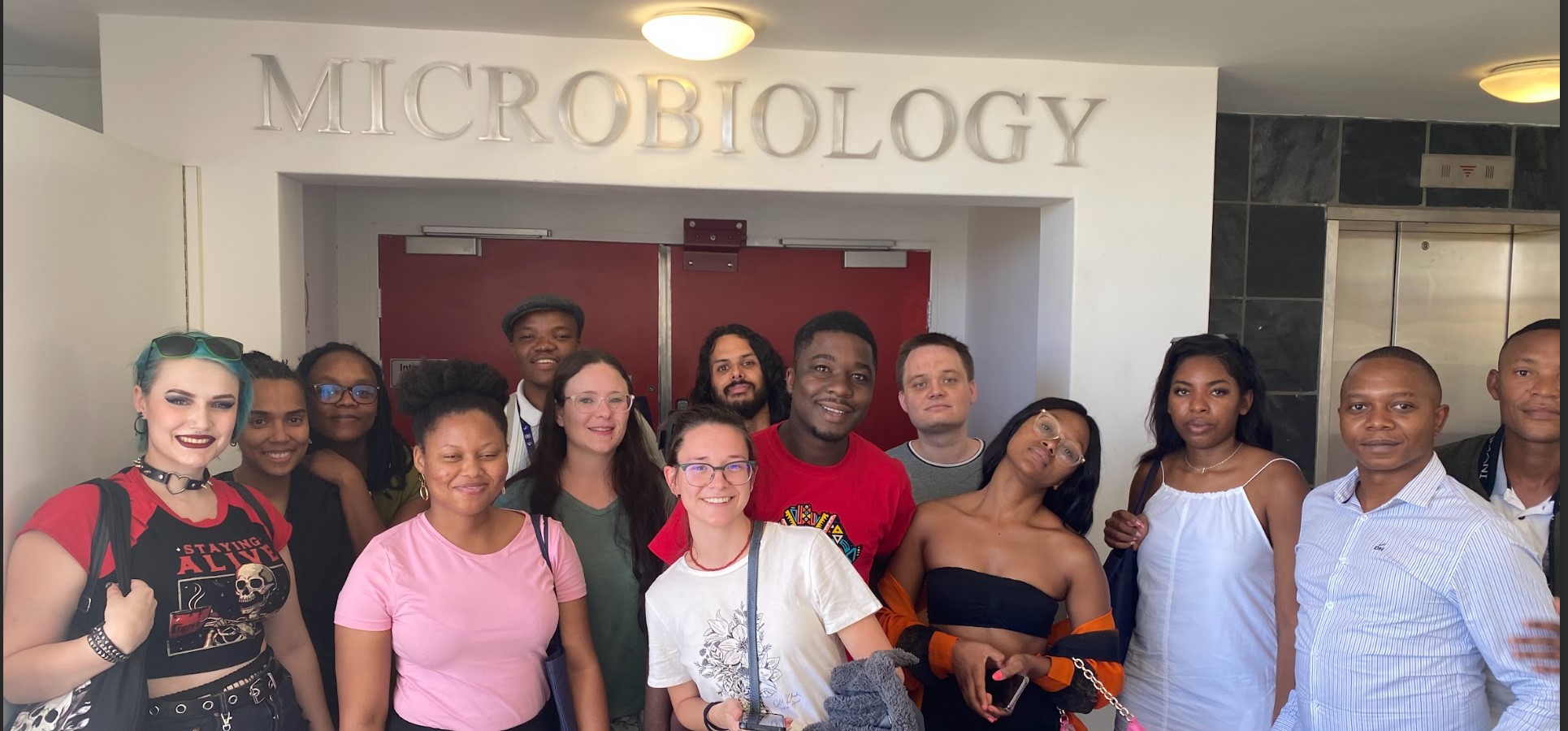
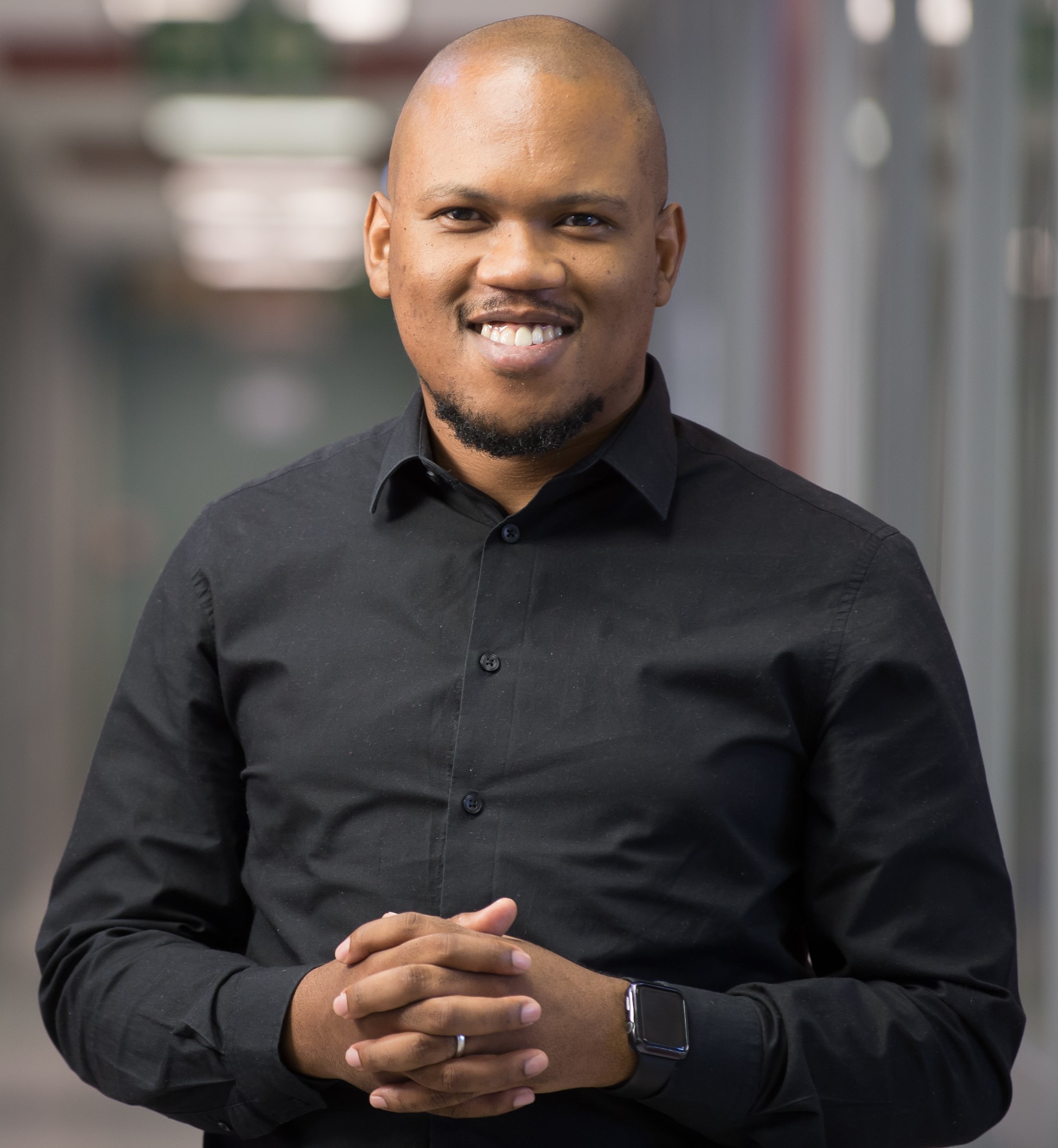 Although Prof Makhalanyane(left) could only attend the National Committee and not the presentations, his students from Pretoria University were able to visit his new workplace at Stellenbosch University. (Photo credit: Riaan Pienaar)
Although Prof Makhalanyane(left) could only attend the National Committee and not the presentations, his students from Pretoria University were able to visit his new workplace at Stellenbosch University. (Photo credit: Riaan Pienaar)
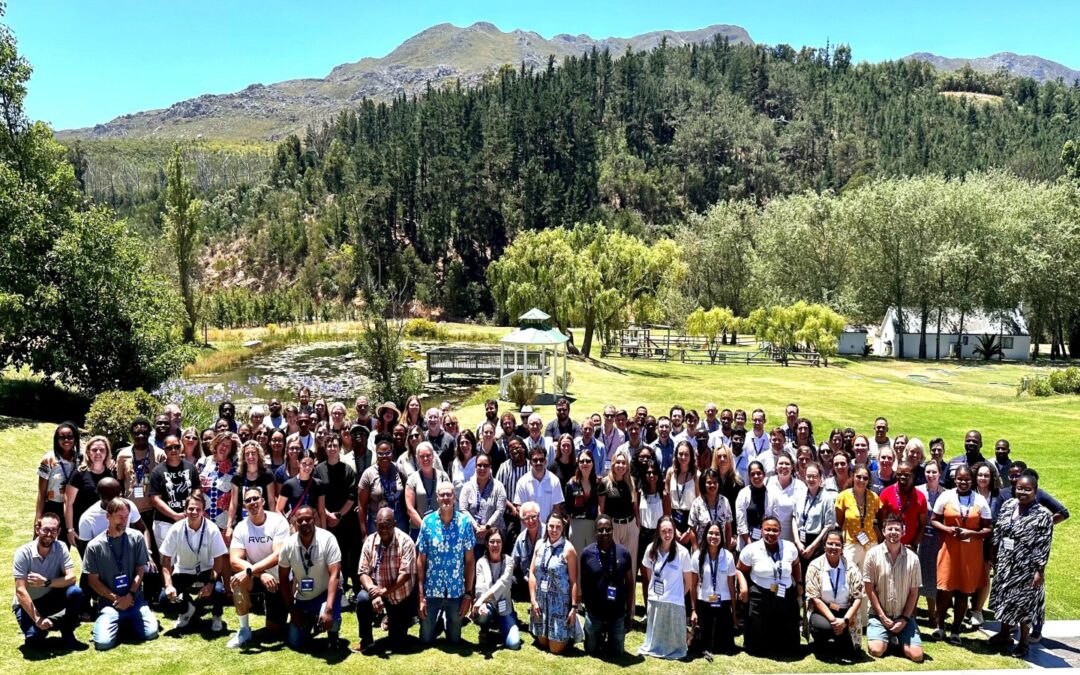
by Ria Olivier | Dec 12, 2023 | International Days, Research, SA Polar Research Infrastructure, SANAP, SANAP Student, SAPRI, SCAR, Science, SEAmester
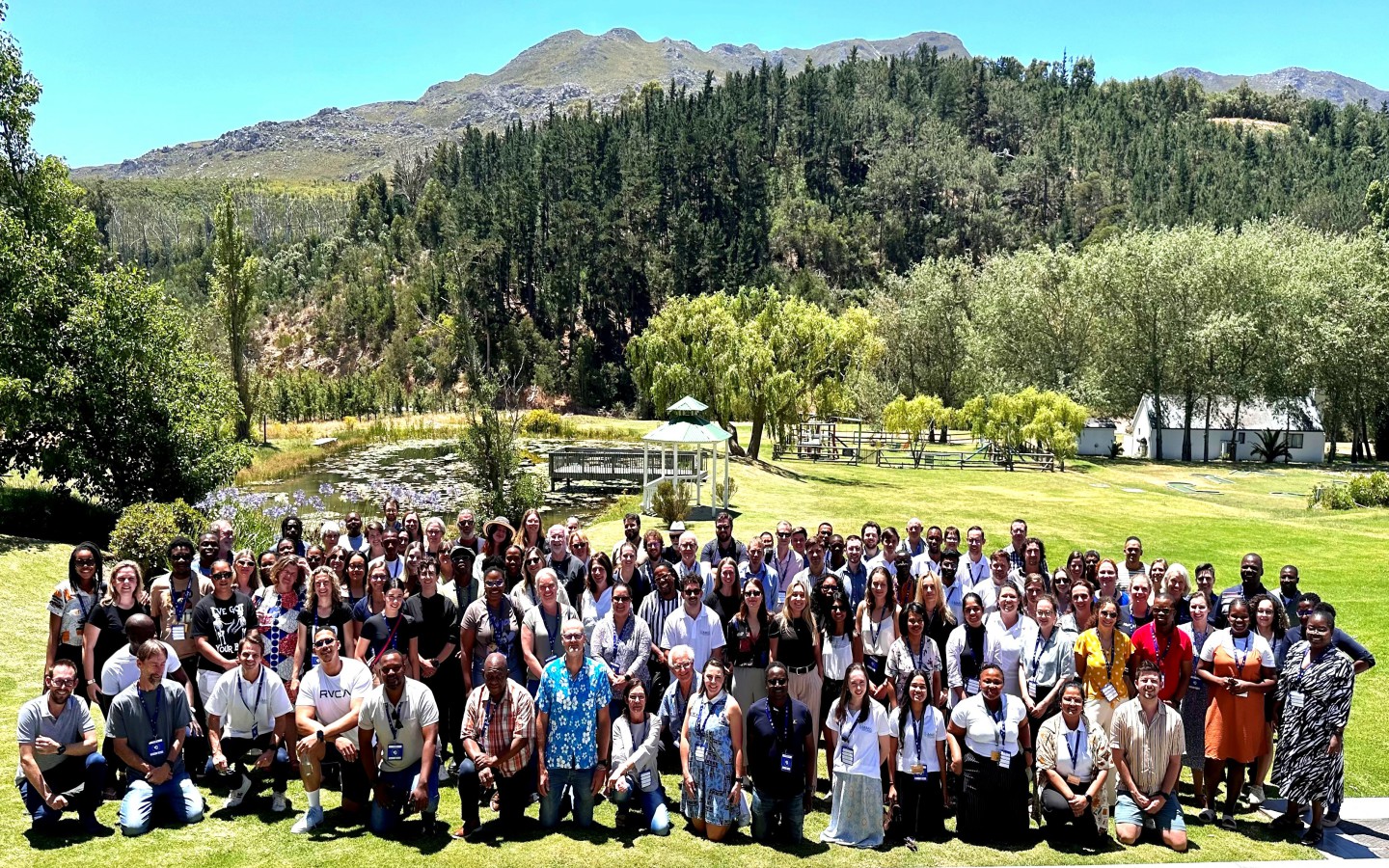 Over a period of 5 days 172 people participate in the 6th SANAP symposium. A lot has happened in the past 4 years since the last symposium in Hermanus in 2018 and feedback on research and other activities within SANAP featured on the program. The symposium was hosted by Stellenbosch University at Houw Hoek Hotel in the Grabouw valley where the participants built on a SANAP Research community for the future.
Over a period of 5 days 172 people participate in the 6th SANAP symposium. A lot has happened in the past 4 years since the last symposium in Hermanus in 2018 and feedback on research and other activities within SANAP featured on the program. The symposium was hosted by Stellenbosch University at Houw Hoek Hotel in the Grabouw valley where the participants built on a SANAP Research community for the future.
The Symposium kicked off with a hybrid meeting of the South African national committee for SCAR and the first evening a keynote lecture was presented by Prof Jukka Tukhuri (Aalto University, Finland) on the discovery of Shackleton’s Endurance on a voyage of the SA Agulhas II. During the symposium keynote lectures and plenary talks were given by Dr Peter Convey of British Antarctic Survey, Dr Sue Tonin of Mouse Free Marion and Prof Marcello Vichi on the Polar Lab part of the South African Polar Research Infrastructure (SAPRI).
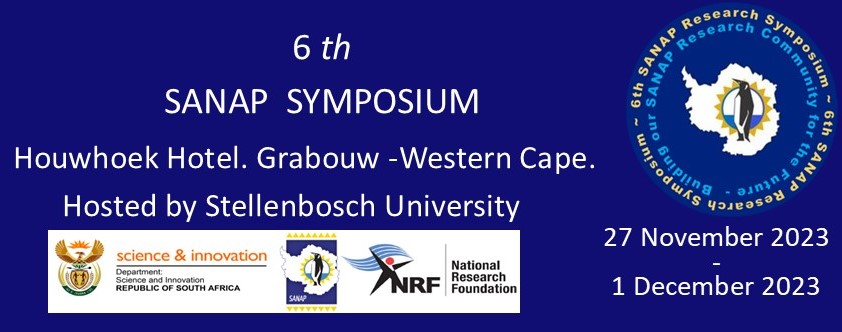 The purpose of the symposium was to facilitate the free exchange of scientific information within SANAP research. In the Marine and Antarctic Research strategy it states that: “The need for coordinated, extensive and targeted research in the marine and oceanic domain has been underlined. Coordination has become important as there has been a shift in marine science from resources and process studies that could be carried out by small groups or individuals to very large-scale regional climate and ecosystem studies, where the success, nooses and benefits lie in the coordination.” One of the strategies outlined is: “creation of a society informed on the value of marine and Antarctic research initiatives.”
The purpose of the symposium was to facilitate the free exchange of scientific information within SANAP research. In the Marine and Antarctic Research strategy it states that: “The need for coordinated, extensive and targeted research in the marine and oceanic domain has been underlined. Coordination has become important as there has been a shift in marine science from resources and process studies that could be carried out by small groups or individuals to very large-scale regional climate and ecosystem studies, where the success, nooses and benefits lie in the coordination.” One of the strategies outlined is: “creation of a society informed on the value of marine and Antarctic research initiatives.”
The following five thematic (vertical) areas were prioritised for research sessions and various principal investigators and researchers within SANAP chaired the sessions:
- Oceans and marine ecosystems under global change – Dr Rampai, Dr Fietz, Dr Thomalla, Dr Nicholson and Dr Lamont
- Earth systems observations – Prof Nel, Dr Lotz
- Ecosystems, biodiversity and biodiscovery – Prof Van Vuuren, Prof Cowan, Dr Greve, Prof Pistorius, Dr Wege,
- Innovation and development – Prof A Bekker
- Human Enterprise – Dr Lavery
Cross-cutting support interventions were discussed such as:
- Coordination and governance by Dr Gilbert Siko and Tracy Klarenbeek
- Human capital development and transformation chaired by Prof Ansorge
- Public awareness and engagement chaired by A Louw
- Research Infrastructure and platforms chaired by Dr T Morris
- Data management chaired by Dr Treasure
Feedback from SA National Committee for SCAR, APECSSA, SCALE expeditions and SEAmester were given and an evening session was held by the APECSSA committee where all the early career researchers that attended the symposium had great discussions. The newly established SAPRI was showcased to the SANAP community in cross discipline sessions on research infrastructure and platforms, data management and engagement, and a keynote lecture on the SAPRI Polar Lab that concluded all the research presentations

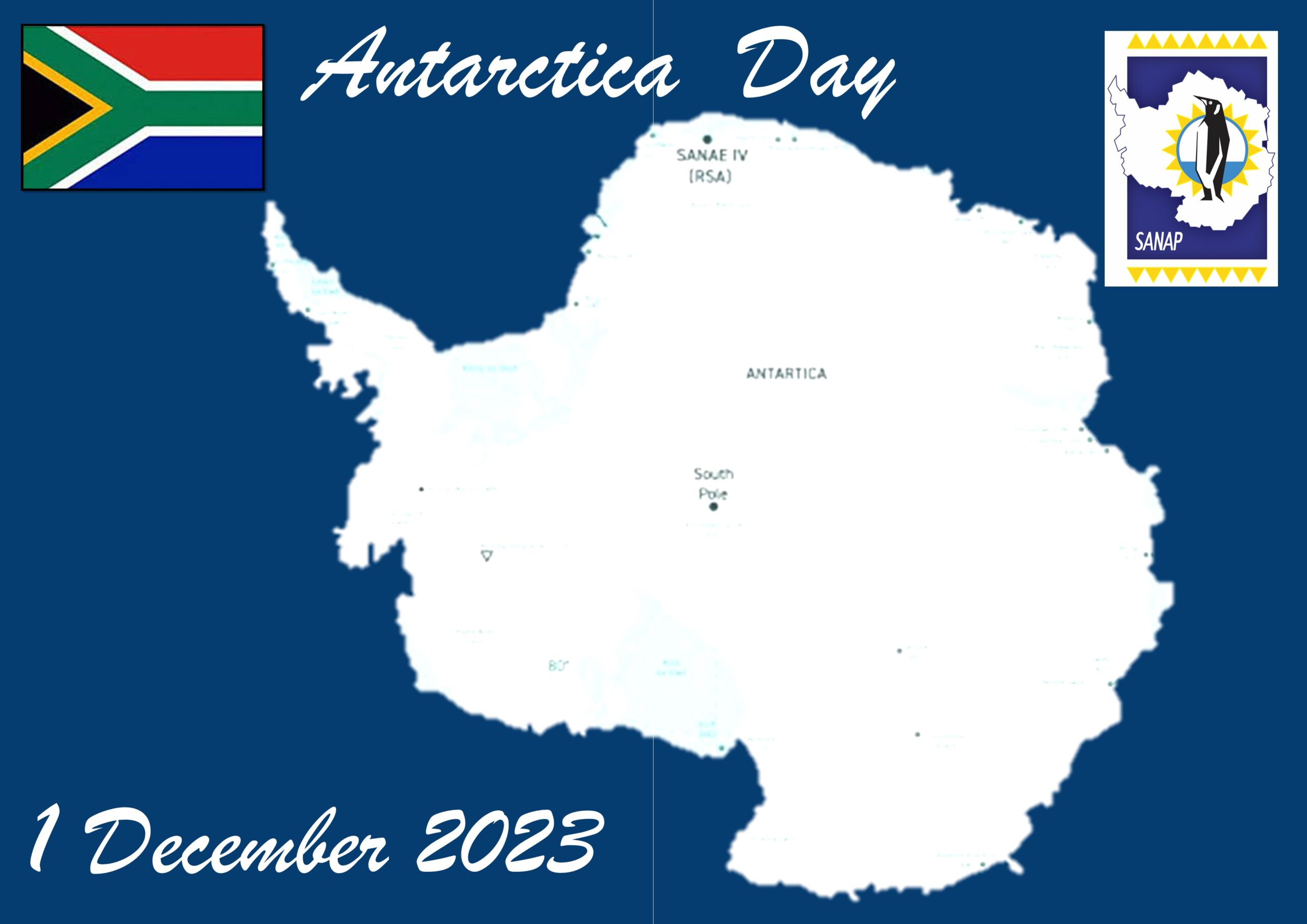 It was the first time that so many South African polar researchers were together on the 1st December on International Antarctic Day and a special Antarctic Breakfast took place to commemorate this International Day. A map of Antarctica, was signed and a cake was provided to celebrate the occasion.
It was the first time that so many South African polar researchers were together on the 1st December on International Antarctic Day and a special Antarctic Breakfast took place to commemorate this International Day. A map of Antarctica, was signed and a cake was provided to celebrate the occasion.
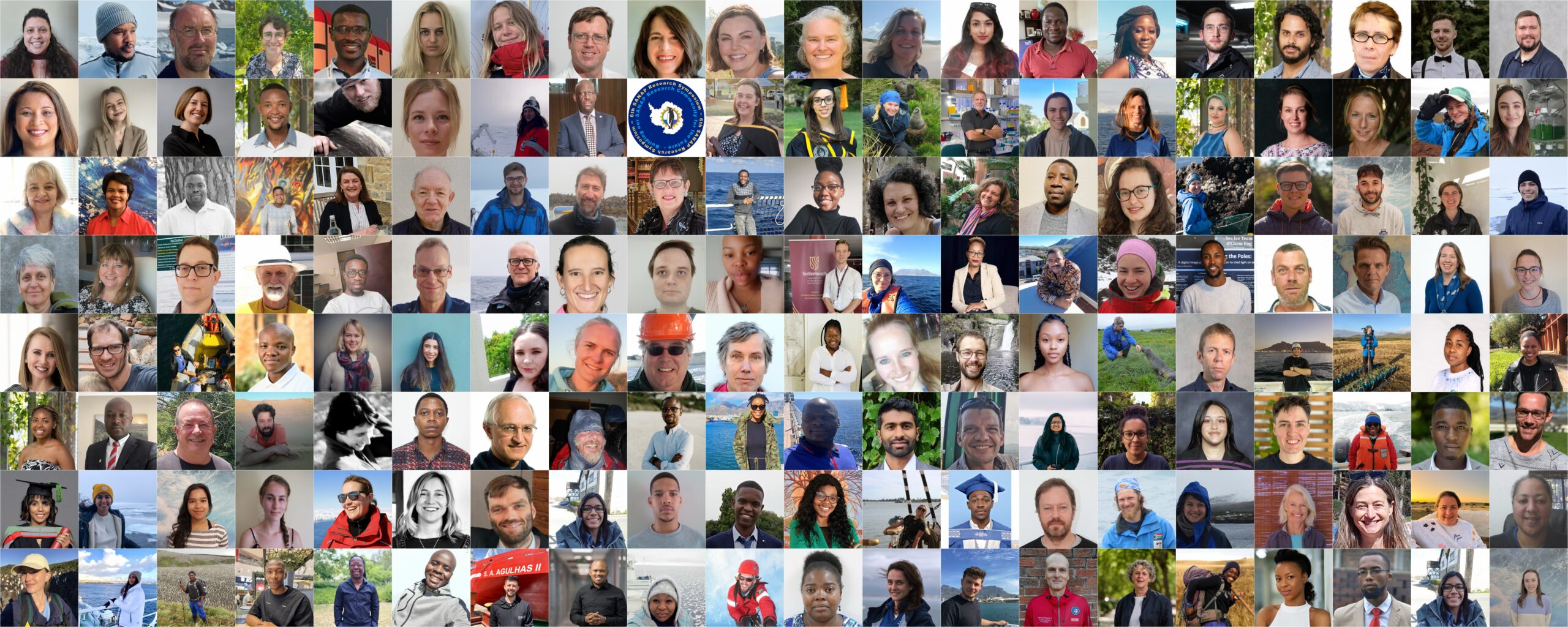 The organising committee would like to thank all participants and attendees for making the 6th SANAP symposium a success and achieving its aim in building a SANAP research Community for the future. We are looking forward to the next Symposium in Kruger National Park in 2025 that will be hosted by a consortium of University of Johannesburg, Fort Hare University and the University of the Free State.
The organising committee would like to thank all participants and attendees for making the 6th SANAP symposium a success and achieving its aim in building a SANAP research Community for the future. We are looking forward to the next Symposium in Kruger National Park in 2025 that will be hosted by a consortium of University of Johannesburg, Fort Hare University and the University of the Free State.
Comment by an ECR: “This was my very first SANAP symposium and it was absolutely incredible! Job well done to all those who assisted in organizing the event. Although it was a jam-packed week, the sessions were extremely interesting and well organized. The location was a perfect venue choice for this kind of event – especially for people to mingle, engage with one another and building strong relationships as well as for making connections for potential research collaborations. I am really impressed with the big focus that this symposium had on Early Career Researchers – I think it is a great way of getting the younger professionals more involved and to network! Congrats on pulling off a very successful SANAP Symposium!”
More will follow of the symposium and sessions that took place with a photos.
A huge thank you to the NRF for making the symposium possible and to all our suppliers and sponsors; Houw Hoek Hotel, Neelsie Travel Bureau, Adjuvo enterprises, Trilogy Audio Services, Crazylicous Cookies.
Featured Image: David Hedding
Image of signatures on Antarctica map : Anche Louw
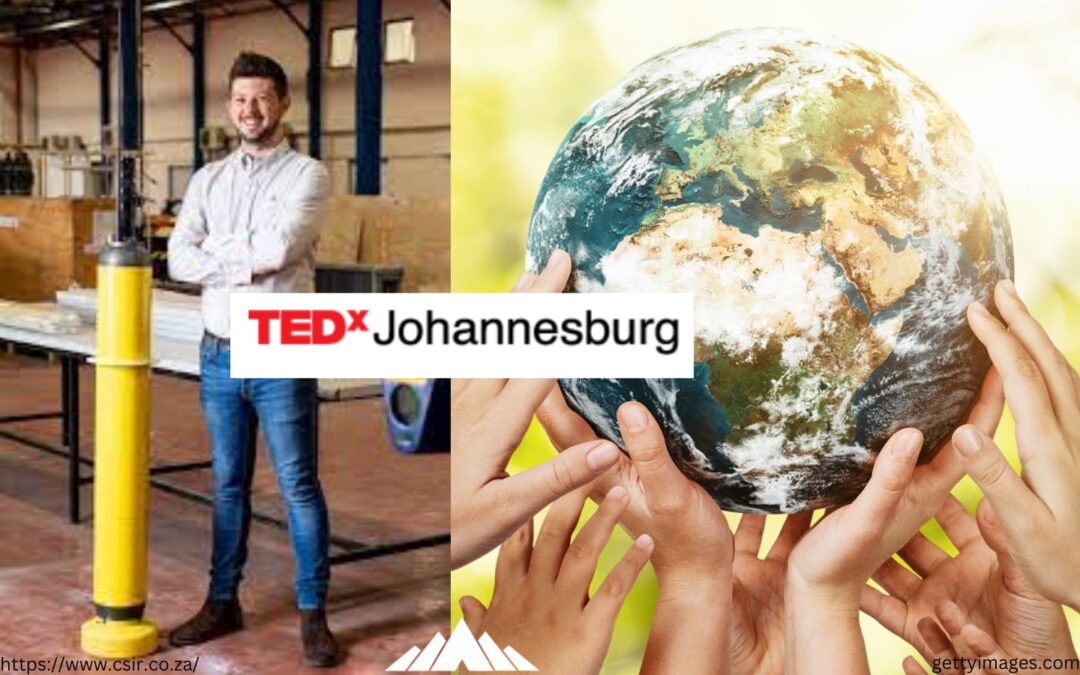
by Ria Olivier | Apr 21, 2023 | International Days, News, Research, Science, Southern Ocean
Tomorrow, 22 April 2023, is Earth Day!
We support environmental protection. One way to encourage people to protect the environment is for environmental scientists to communicate scientific findings in a way that is digestible for your audience.
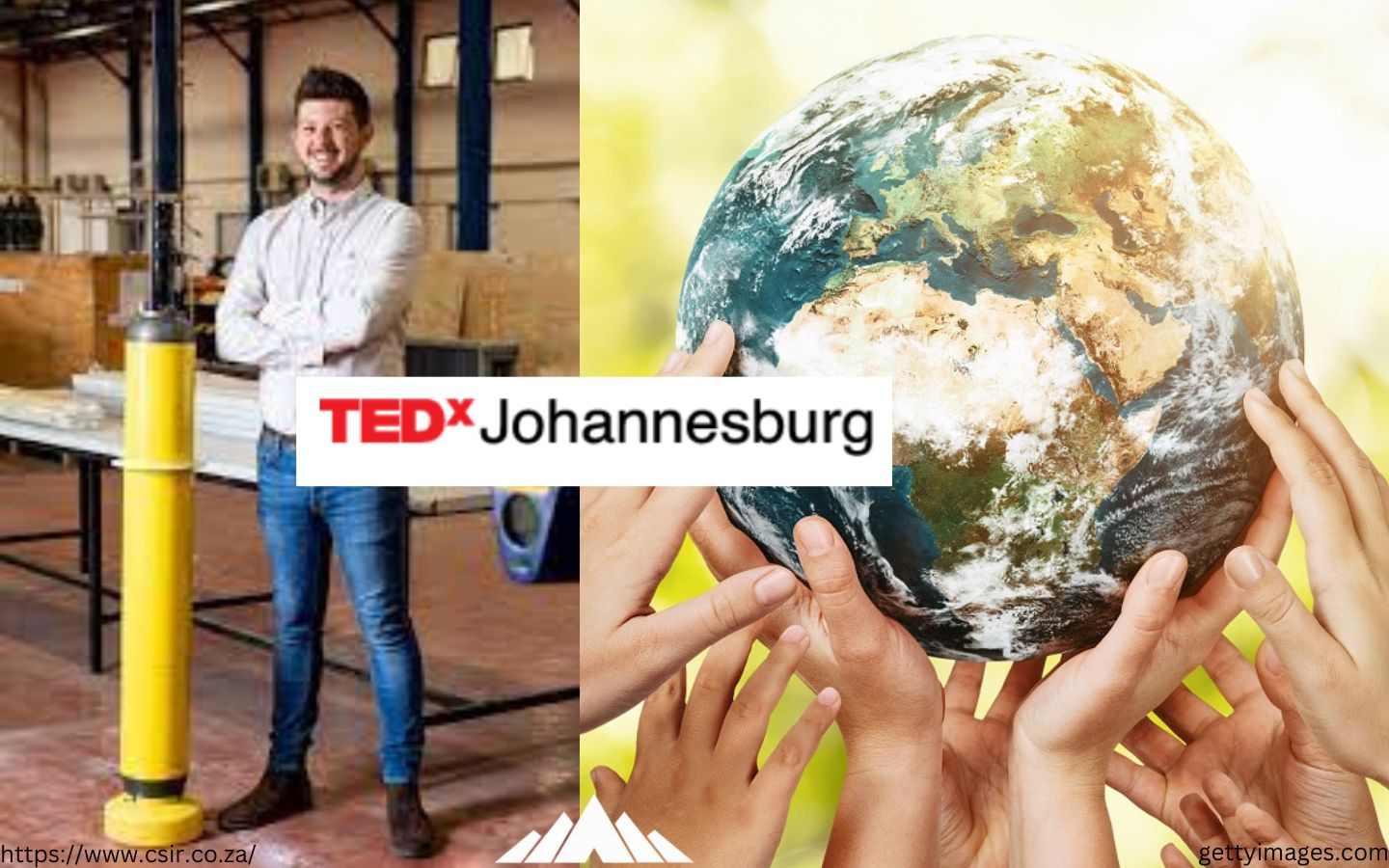
It is with great pleasure that we share that Dr Thomas Ryan-Keogh will be a speaker at TEDx Johannesburg Countdown to talk about the impacts of climate change on the Southern Ocean. “His talk will contribute towards the dialogue and action on climate change and will showcase how the CSIR is contributing towards global research efforts on the impact of climate change in Antarctica and the Southern Ocean”.
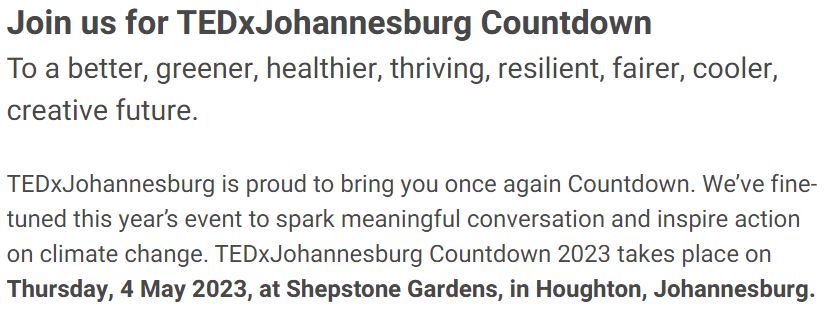 Book your seat today!
Book your seat today!
TEDx Johannesburg is a great platform where “remarkable people doing great work can amplify their ideas on the world wide web”.
“We believe that their ideas, delivered at our sought-after events, and distributed via video on the web, will change the world” – TEDx Johannesburg.
At this event, Tommy will have only 12 minutes to share his recent oceanographic research findings, “which showed that the natural carbon cycle in the Southern Ocean is being impacted and that it could be causing even more harmful climate impacts. These findings were recently published in the top-rated journal Science under the title: Multidecadal trend of increasing iron stress in Southern Ocean phytoplankton” – CSIR
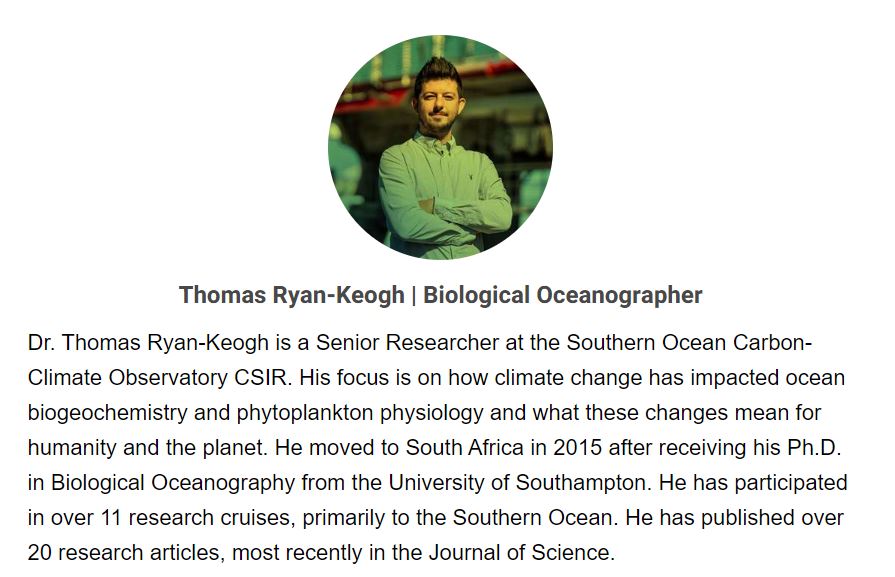
Source: TEDxJohannesburg Countdown
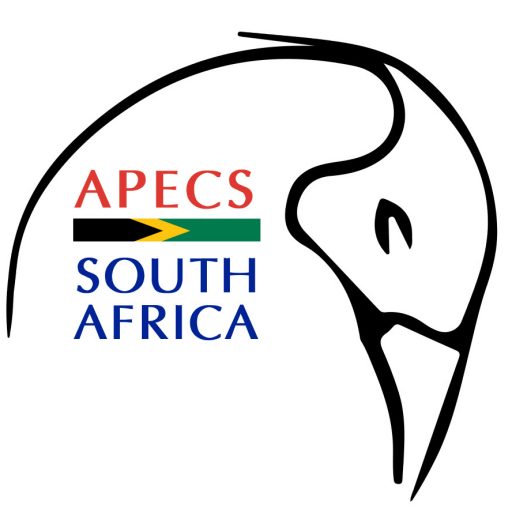 Tommy is the Chair of the Association of Polar Early Career Scientists of South Africa. APECS-SA is a “National Committee of APECS international, a non-profit and voluntary organization which focuses on improving communication between young polar researchers on a local and international level.”
Tommy is the Chair of the Association of Polar Early Career Scientists of South Africa. APECS-SA is a “National Committee of APECS international, a non-profit and voluntary organization which focuses on improving communication between young polar researchers on a local and international level.”
On Social Media:
Watch this video below and learn more about the current climate crisis and The Intergovernmental Panel on Climate Change (IPCC) climate report.
“This is an important message for the world to take in: make the economy, make the development clean and climate friendly” Hoesung Lee (Chair of the IPCC).
Find the IPCC report here.
Anche Louw, South African Polar Research Infrastructure (SAPRI DPS Node), 21 April 2023



 On South Africa’s National Women’s Day we celebrate all the women involved in the South African National Antarctic Programme (SANAP). In the 60 years since the vents of 1956, the phrase has come to represent women’s courage and strength in South Africa. This day is celebrated to empower women and raise awareness. In the last few years many events came about within the Antarctic environment. See the events on the Scientific Committee on Antarctic Research website. In South Africa many women play a leading role within the SANAP.
On South Africa’s National Women’s Day we celebrate all the women involved in the South African National Antarctic Programme (SANAP). In the 60 years since the vents of 1956, the phrase has come to represent women’s courage and strength in South Africa. This day is celebrated to empower women and raise awareness. In the last few years many events came about within the Antarctic environment. See the events on the Scientific Committee on Antarctic Research website. In South Africa many women play a leading role within the SANAP.

 From L-R: The Department of Environment, Fisheries and Forestry: Minister Barbara Creecy; the Department of Science and Innovation: (previous) Minister Naledi Pandor and of the National Research Foundation (NRF) Director: Knowledge Advancement and Support, Tracy Klarenbeek
From L-R: The Department of Environment, Fisheries and Forestry: Minister Barbara Creecy; the Department of Science and Innovation: (previous) Minister Naledi Pandor and of the National Research Foundation (NRF) Director: Knowledge Advancement and Support, Tracy Klarenbeek

 Within the Department of Environment, Fisheries and Forestry; (From L- R) Deputy Director-General Oceans and Coasts: Ms Judy Beaumont, Deputy Director: Vessel and Helicopter Management .Directorate: Southern Oceans and Antarctic Support: Ms Khuselwa Ngxabani; Operations and Logistics. Deputy Director: Chuma Phamoli
Within the Department of Environment, Fisheries and Forestry; (From L- R) Deputy Director-General Oceans and Coasts: Ms Judy Beaumont, Deputy Director: Vessel and Helicopter Management .Directorate: Southern Oceans and Antarctic Support: Ms Khuselwa Ngxabani; Operations and Logistics. Deputy Director: Chuma Phamoli


 66% of the South Africa National Committee for SCAR is women and chaired by Bettine Jansen van Vuuren(left). 70% of APECSSA is also women, chaired by Liezel Rudolph(2nd) and the founder member was Christel Hansen(3rd). The Champion for South Africa Gateway City, Cape Town is Rudzani Silima(right).
66% of the South Africa National Committee for SCAR is women and chaired by Bettine Jansen van Vuuren(left). 70% of APECSSA is also women, chaired by Liezel Rudolph(2nd) and the founder member was Christel Hansen(3rd). The Champion for South Africa Gateway City, Cape Town is Rudzani Silima(right).

 The two team leaders currently at the South African stations on SANAE(59) and at Marion Island(77) are women. Dr Abigail(Aby) Paton (left) is not new to SANAP and the first women to do 3 consecutive overwinters in Antarctica (SANAE54,55,56 see images below). Winnie Moodaley (middle) was a member of Marion 76 and to stayed on as Leader for Marion 77 so this is also her consecutive year. Michelle(Risi)Jones(right) current at Gough Island is part of Gough 64 and Gough 65.
The two team leaders currently at the South African stations on SANAE(59) and at Marion Island(77) are women. Dr Abigail(Aby) Paton (left) is not new to SANAP and the first women to do 3 consecutive overwinters in Antarctica (SANAE54,55,56 see images below). Winnie Moodaley (middle) was a member of Marion 76 and to stayed on as Leader for Marion 77 so this is also her consecutive year. Michelle(Risi)Jones(right) current at Gough Island is part of Gough 64 and Gough 65.

 Gendered Power Relations and Sexual Harassment in Antarctic Science in the Age of #MeToo by Meredith Nash and Hanne Nielsen Published online: 09 Jun 2020. “The presence and impact of female Antarctic researchers has increased rapidly. In the 1950s most countries did not allow women to work in Antarctica and there were few female Antarctic scientists. Today females are playing leading and influential roles in Antarctic research.”
Gendered Power Relations and Sexual Harassment in Antarctic Science in the Age of #MeToo by Meredith Nash and Hanne Nielsen Published online: 09 Jun 2020. “The presence and impact of female Antarctic researchers has increased rapidly. In the 1950s most countries did not allow women to work in Antarctica and there were few female Antarctic scientists. Today females are playing leading and influential roles in Antarctic research.” 
 Celebration of Women in Antarctic Research 23 August 2016,Malaysia. This event was a celebration of female Antarctic researchers and aimed to raise their profile to help provide more visible female role models for early career scientists. SANAP was represented(image right).
Celebration of Women in Antarctic Research 23 August 2016,Malaysia. This event was a celebration of female Antarctic researchers and aimed to raise their profile to help provide more visible female role models for early career scientists. SANAP was represented(image right).

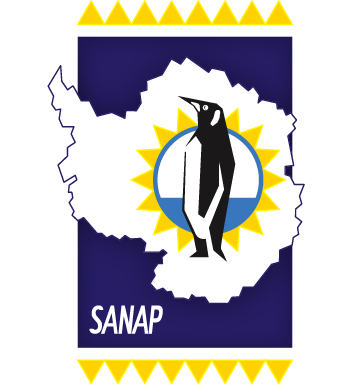

 During the 6th SANAP symposium, time was allocated for the presentation of governance issues, and this was done on the first day during the opening ceremony. Dr Gilbert Siko , the Director of Marine & Polar Research at the Department of Science and Innovation gave the first presentation. His role within the Research Development and Support Programme it is to promote the development of research, the production of scientific knowledge, and human capital development in science areas in which South Africa enjoys a geographic advantage, that includes Antarctic and marine research. Dr Siko highlighted the strategic importance of the research conducted through the South African National Antarctic Programme.
During the 6th SANAP symposium, time was allocated for the presentation of governance issues, and this was done on the first day during the opening ceremony. Dr Gilbert Siko , the Director of Marine & Polar Research at the Department of Science and Innovation gave the first presentation. His role within the Research Development and Support Programme it is to promote the development of research, the production of scientific knowledge, and human capital development in science areas in which South Africa enjoys a geographic advantage, that includes Antarctic and marine research. Dr Siko highlighted the strategic importance of the research conducted through the South African National Antarctic Programme. Dr Siko was followed by Tracy Klarenbeek, Director of Knowledge Advancement and Support of the National Research Foundation (NRF). She highlighted that create innovative funding instruments such as SANAP serve to transform the scientific landscape and inspire a representative research community to aspire to global competitiveness. She shared the outcomes of the 2023 SANAP Call for Proposals for funding cycle 2024 – 2026 with the community. She also mentioned that mentorship initiatives for unsuccessful applicants would be implemented via SAPRI.(right)
Dr Siko was followed by Tracy Klarenbeek, Director of Knowledge Advancement and Support of the National Research Foundation (NRF). She highlighted that create innovative funding instruments such as SANAP serve to transform the scientific landscape and inspire a representative research community to aspire to global competitiveness. She shared the outcomes of the 2023 SANAP Call for Proposals for funding cycle 2024 – 2026 with the community. She also mentioned that mentorship initiatives for unsuccessful applicants would be implemented via SAPRI.(right)
 Prof Bettine van Vuuren (right), Chair of the
Prof Bettine van Vuuren (right), Chair of the  A printed Map of Antarctica was signed by everyone on International Antarctica Day 1st December 2023 at Houw Hoek Hotel!
A printed Map of Antarctica was signed by everyone on International Antarctica Day 1st December 2023 at Houw Hoek Hotel!
 Another session within the
Another session within the  Above (l-r): Pedro Lebre, Silindile Maphosa, Lefentse Mashamaite
Above (l-r): Pedro Lebre, Silindile Maphosa, Lefentse Mashamaite Prof Makhalanyane project presentations. Above (l-r): Runesu Bakasa, Marike Hillocks, Riaan Pierneef, Mancha Mabaso, Choaro Dithugoe
Prof Makhalanyane project presentations. Above (l-r): Runesu Bakasa, Marike Hillocks, Riaan Pierneef, Mancha Mabaso, Choaro Dithugoe Above: (l-r)Nosipho Hlalukana, Nyasha Mafumo, Phillip Mawire, Mayinbogwe Buthelezi
Above: (l-r)Nosipho Hlalukana, Nyasha Mafumo, Phillip Mawire, Mayinbogwe Buthelezi Poster Presentations. Above (l-r): Sade Magabotha, Christophe Lefebvre, Elizabe Malan, Benjamin Abraham, Nelisiwe Hedebe, Michelle Bekker
Poster Presentations. Above (l-r): Sade Magabotha, Christophe Lefebvre, Elizabe Malan, Benjamin Abraham, Nelisiwe Hedebe, Michelle Bekker
 Although Prof Makhalanyane(left) could only attend the National Committee and not the presentations, his students from Pretoria University were able to visit his new workplace at Stellenbosch University. (Photo credit: Riaan Pienaar)
Although Prof Makhalanyane(left) could only attend the National Committee and not the presentations, his students from Pretoria University were able to visit his new workplace at Stellenbosch University. (Photo credit: Riaan Pienaar)
 Over a period of 5 days 172 people participate in the
Over a period of 5 days 172 people participate in the  The purpose of the symposium was to facilitate the free exchange of scientific information within SANAP research. In the
The purpose of the symposium was to facilitate the free exchange of scientific information within SANAP research. In the 
 It was the first time that so many South African polar researchers were together on the 1st December on International Antarctic Day and a special Antarctic Breakfast took place to commemorate this International Day. A map of Antarctica, was signed and a cake was provided to celebrate the occasion.
It was the first time that so many South African polar researchers were together on the 1st December on International Antarctic Day and a special Antarctic Breakfast took place to commemorate this International Day. A map of Antarctica, was signed and a cake was provided to celebrate the occasion. The organising committee would like to thank all participants and attendees for making the 6th SANAP symposium a success and achieving its aim in building a SANAP research Community for the future. We are looking forward to the next Symposium in Kruger National Park in 2025 that will be hosted by a consortium of University of Johannesburg, Fort Hare University and the University of the Free State.
The organising committee would like to thank all participants and attendees for making the 6th SANAP symposium a success and achieving its aim in building a SANAP research Community for the future. We are looking forward to the next Symposium in Kruger National Park in 2025 that will be hosted by a consortium of University of Johannesburg, Fort Hare University and the University of the Free State.



 Tommy is the Chair of the
Tommy is the Chair of the 
